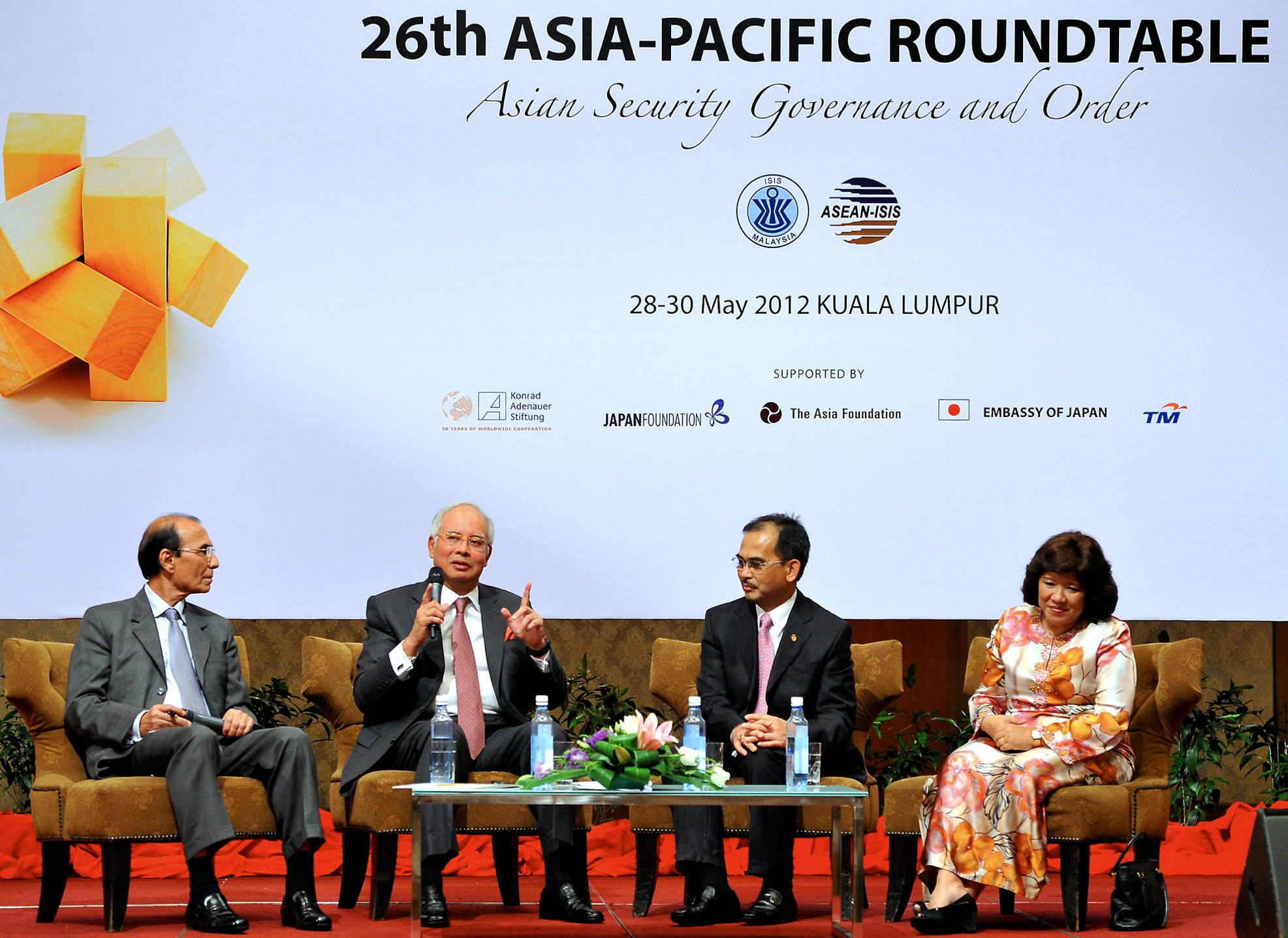ID :
241993
Tue, 05/29/2012 - 04:52
Auther :
Shortlink :
https://www.oananews.org//node/241993
The shortlink copeid
Asia Must Take Greater Responsibility For Its Own Security - M'sian PM

KUALA LUMPUR, May 29 (Bernama) -- Asia must assume greater responsibility for its own security and establish frameworks to ensure its safety and uphold its interests, Malaysian Prime Minister Najib Razak said Monday.
Speaking at the 26th Asia-Pacific Roundtable themed, "Asian Security Order and Governance", here, Najib (second from left) said Asia needed to change its mindset that had heretofore been programmed to focus on economic development at the expense of security issues.
"While we value the assistance from our friends who have contributed immensely to regional stability, Asia must transform itself from being a consumer to a producer of security," he said.
Najib also pointed out that if Asia were to be a force in global politics, it could not shy away from speaking out and taking positions on seemingly sensitive issues such as nuclear disarmament, arms build-up and military alliances.
"Asia must stand up and be counted," he said.
In charting Asia's future, Najib spelt out two important considerations -- firstly that relationships must be founded on a broad spectrum of areas and not be defined by single issues and secondly, there is no place for rivalry in Asia.
Najib said Asia should not be fixated on economic benefits alone as it would be harmful for regional stability if the region allowed itself to be conditioned by military concerns.
"Take Asean as an example. The three pillars – political-security, economic and socio-cultural – need to be equally strong, otherwise, the stability of the 10-member organisation will be in jeopardy.
"Asia cannot stand on one leg; it needs to strengthen its foundation, and that will include, among other things, deepening its people-to-people relations."
Najib said Asia should not allow conflicts and the jostling for power to divide them again.
"What we need is cooperation, and thankfully there is an abundance of that in Asia," he said.
He pointed out that since 1967, Asean had recognised the value of stability and had founded its relations based on the principles of mutual respect and "prosper thy neighbour," and the spirit of cooperation pioneered by Asean had since been extended beyond Southeast Asia.
The prime minister said Asia rejected extremism in all forms but recognised that when differences and diverging interests manifested themselves, the outlier voices must be heard.
"Marginalising opposing opinions is counter-productive and will only serve to harden old grievances and fuel new ones," he said.
Najib said it was easy to advocate peace, and the peaceful resolution of disputes.
"But, as members of the diplomatic corps will no doubt agree, putting these ideals into practice is anything but easy."
Citing the great British statesman, Winston Churchill that "to jaw-jaw is always better than to war-war", Najib said through communication and dialogue, they could work out differences.
Najib said it would be a mistake for Asia to focus myopically on the economic success story alone, and Asia's economic prosperity had been accompanied by alarming concomitant effects.
"Throughout history, states have been taking measures to bolster their defences and military power as they became richer. The top five country recipients of arms transfer from 2007 to 2011 were Asian - India, South Korea, Pakistan, China and Singapore," he said.
Najib said these countries accounted for 30 per cent of the volume of international arms imports.
"Asia cannot leave the protection of the region's peace and security to chance as they have to take proactive steps towards the construction of a pluralistic security community in which the use of force is not an option.
"We cannot rely merely on pronouncements of friendship and peaceful intent. We need to work through our problems and to accommodate diverging interests, if these emerge," he said.
Also present were Malaysian Institute of Strategic and International Studies (ISIS) Chairman Mohamed Jawhar Hassan (left), ASEAN Institutes of Strategic and International Studies Chairperson and Permanent Secretary of the Prime Minister's Office, Brunei Darussalam Awang Mohd Roselan Mohd Daud (second from right) and ISIS Chief Executive Dr Mahani Zainal Abidin (right). (photoBERNAMA)
MALAYSIA





